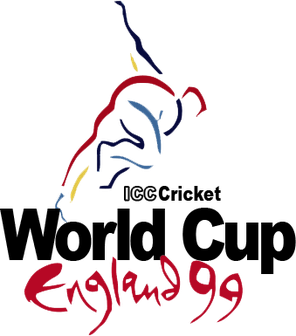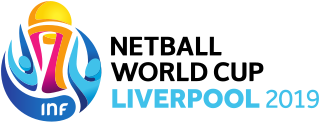
The 1999 ICC Cricket World Cup, also branded as England '99, was the seventh edition of the Cricket World Cup, organised by the International Cricket Council (ICC). It was hosted primarily by England, with selected matches also played in Scotland, Ireland, Wales and the Netherlands. The tournament was won by Australia, who beat Pakistan by 8 wickets in the final at Lord's in London.

The 1999 Rugby World Cup, was the fourth Rugby World Cup, the quadrennial international rugby union championship, the first World Cup to be held in the sport's professional era.
The 2006 FIFA World Cup qualification competition was a series of tournaments organised by the six FIFA confederations. Each confederation – the AFC (Asia), CAF (Africa), CONCACAF, CONMEBOL, OFC (Oceania), and UEFA (Europe) – was allocated a certain number of the 32 places at the tournament. A total of 197 teams entered the qualification process for the 2006 FIFA World Cup. In 2001 FIFA ended automatic qualification of the reigning champion, so that 2002 champions Brazil became first to participate in the qualifying tournament. The hosts (Germany) retained their automatic spot.
The 2002 FIFA World Cup qualification competition was a series of tournaments organised by the six FIFA confederations. Each confederation — the AFC (Asia), CAF (Africa), CONCACAF, CONMEBOL, OFC (Oceania), and UEFA (Europe) — was allocated a certain number of the 32 places at the tournament. 199 teams entered the tournament qualification rounds, competing for 32 spots in the final tournament. South Korea and Japan, as the co-hosts, and France, as the defending champions, qualified automatically, leaving 29 spots open for competition.

The Canada national baseball team represents Canada in international baseball. They are overseen by Baseball Canada, the governing body of baseball in Canada.

The Rugby Africa Cup is a two-year men's rugby union tournament involving the top 16 African nations based on their World Rugby rankings, it is organised by Rugby Africa. The tournament was first held in 2000. It was renamed the Rugby Africa Cup in November 2019, it was previously called the Africa Cup since 2006, the CAR Top 9 and CAR Top 10.

The Confederation of African Football (CAF) section of the 2010 FIFA World Cup qualification saw teams compete for five berths in the final tournament in South Africa. The qualification stage doubled as the qualification stage for the 2010 African Cup of Nations, with fifteen teams qualifying for the finals held in Angola.

2011 Rugby World Cup qualifying began at the 2007 tournament in France, where twelve teams earned a place in the finals of the tournament, this automatically qualified them for the 2011 Rugby World Cup in New Zealand.

The 2009 Baseball World Cup (BWC) was the 38th international men's amateur baseball tournament. The tournament was sanctioned by the International Baseball Federation, which titled it the Amateur World Series from the 1938 tournament through the 1986 AWS. The 2009 tournament was held, for the first time, across a continent — with games played in 27 cities across eight European countries, from September 9 to 27. The final was a repeat of the previous BWC final, with the United States again defeating Cuba, winning its fourth title. Canada won the bronze medal, the nation's first medal in the tournament, after defeating Puerto Rico 6–2.

The Netball World Cup Sydney 2015 (NWC2015) was the 14th edition of the INF Netball World Cup, the premier competition in international netball. It was held from 7–16 August, in Sydney, Australia, which secured hosting rights after defeating a rival bid from Manchester, England. Matches were played at Allphones Arena and Netball Central. Sixteen nations competed at the championships, including the top six teams from the 2011 World Netball Championships in Singapore. After two rounds in which teams competed in pools of four, Australia, New Zealand, England and Jamaica contested the semi-finals. Australia defended its 2011 title against New Zealand by a narrow 58–55 victory. The final at Allphones Arena was attended by 16,752 people, a world record for any netball game. Malawian shooter Mwai Kumwenda was the player of distinction.

The 2019 Netball World Cup was the 15th edition of the INF Netball World Cup. It was held from 12–21 July 2019 at the Liverpool Arena in Liverpool, England with matches being held on two courts. Host nation England finished their campaign with a bronze medal. New Zealand became 5th time champions after beating Australia in the final and gold medal match.

The Netball World Youth Cup Gaborone 2017 was the eighth staging of the tournament previously known as the World Youth Netball Championships, the premier competition in international netball, contested every four years. The 2017 tournament, to be held from 8–16 July, held in Gaborone, Botswana, which is first African region country to host the tournament. Matches are to be played at University of Botswana Indoor Stadium and Ditshupo Hall. Twenty nations competed at the championships.
The 2021 Men's Rugby League World Cup qualification was the qualifying process which will decide the 8 teams that would join the 8 quarter-finalists from the 2017 World Cup including the hosts England, who received an automatic spot, at the 2021 Rugby League World Cup. The process commenced in June 2018, with the commencement of the 2018–19 Rugby League European Championship C tournament, which acted as the first round for European qualification.

The 2021 Rugby World Cup was the ninth staging of the women's Rugby World Cup, as organised by World Rugby. It was held from 8 October to 12 November 2022 in Auckland and Whangārei, New Zealand. It was originally scheduled to be held in 2021, but was postponed by one year due to the COVID-19 pandemic.
Twelve teams qualified for men's rugby sevens at the 2020 Summer Olympics. Japan automatically qualified as host, with the top four teams of the 2018–19 World Rugby Sevens Series securing their spots. Afterwards, qualification was determined with each of the six continental confederations determining a representative, and the remaining qualification spot determined through an international sevens tournament.

The 2023 Netball World Cup was the sixteenth staging of the Netball World Cup, the premier competition in international netball, contested every four years. The tournament was held from 28 July to 6 August at the International Convention Centre in Cape Town, South Africa, its first time in Africa.
The qualification process for the 2023 Rugby World Cup in France began during the pool stages of the 2019 tournament in Japan, at which the top three teams from each of the four pools qualified automatically for the 2023 event. A further eight teams qualified through regional, cross-regional play-offs and the repechage process.

The qualification process for the 2021 Rugby World Cup began on 9 August 2019 with 12 teams qualifying to the tournament which was to be held in New Zealand. The 2021 Rugby World Cup was postponed by one year in March 2021 to 2022 due to the COVID-19 pandemic.
The 2021–22 Rugby Africa Cup, which doubled as Qualifying for the 2023 Rugby World Cup for Africa began in June 2021, where teams competed for one direct qualification spot into the final World Cup tournament and for one place in the final Qualification Tournament.
The 2021 Sudamérica Rugby Sevens was the 15th edition of the Sudamérica Sevens. It was held in San José, Costa Rica from 27–28 November. It was a qualifier for the 2022 World Rugby Sevens Challenger Series in Chile and 2022 Rugby World Cup Sevens in South Africa. Uruguay and Chile were the two teams that qualified as winner and runner-up.












